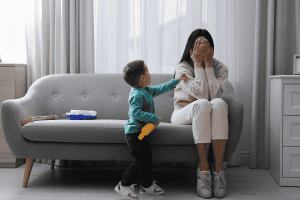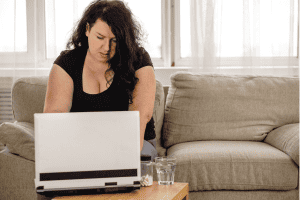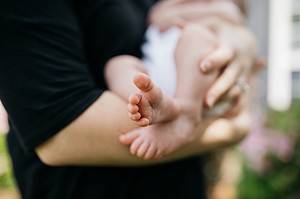Navigating mismatched intimacy: when becoming a parent changes the dynamic
Do you feel like you’re on different wavelengths with your partner when it comes to sex post-childbirth? You’re not alone. Studies have shown that many couples experience a drop in their overall relationship satisfaction following birth, and this includes intimacy.
When we unpack the myriad of physical, emotional, and lifestyle changes that parenthood introduces, it’s no surprise that intimacy can be profoundly impacted. And, when we understand what is getting in the way, we can understand how to rekindle desire.
What gets in the way of intimacy post-children?
When asking parents about their most common obstacles to a regular sex life, some of the most common responses we hear are:
- “There is no time.”
- “We can’t find babysitters.”
- “I’m waiting until I feel like it.”
- “I prefer sex to be spontaneous.”
- “We can’t afford dates.”
- “We are too tired.”
- “It’s so hard to feel romantic right now.”
- “I don’t pick up on my partner’s cues which has led my partner to feel rejected.”
This reflects how exhaustion, body recovery, mismatched libidos, and feeling over-busy can all stand in the way of intimacy.
Parenthood brings a whirlwind of changes, and these shifts can significantly impact sex and intimacy between partners:
1. Birth Trauma
For the person who experienced the trauma, it can lead to various emotional and physical repercussions. The trauma itself might lead to emotional distress, fear, or anxiety around the idea of intimacy.
2. Physical recovery after childbirth
This is especially relevant if there were complications or a caesarean section or injury, which can lead to discomfort and pain, making it difficult for couples to resume sexual intimacy.
3. Lack of time and energy
The demands of caring for a newborn and adjusting to the new responsibilities of parenthood can leave little time and energy for intimacy, leading to a decrease in sexual activity.
4. Emotional changes that come with starting a family
These changes can affect a person’s libido and desire for intimacy, as parent’s may be preoccupied with concerns about the baby’s wellbeing or experiencing postpartum mood swings.
5. Shift in priorities
In parenthood, the focus often shifts from the couple’s relationship to the needs of the child, which can reduce the emphasis on sexual and intimate aspects of the relationship.
6. Communication barriers
Sleep deprivation and stress can lead to communication breakdowns, making it challenging for partners to discuss their feelings and needs regarding sex and intimacy, further impacting their physical and emotional connection.
Rekindling intimacy and desire after having children
There are many ways to stay connected with your partner and to prioritise intimacy (and remember, intimacy is about much more than sex).
Improving communication, prioritising self-care, and being flexible in experimenting with intimacy can be a great start.
This might look like checking in about the current split of household tasks – are you both comfortable with how these tasks are being divided?
Spending time together can be more challenging when you’re new parents, however it’s still important to find some time to focus on each other and your relationship. If babysitting isn’t an option, you might choose to take your baby out for a walk in the pram while you have a chat, or intentionally making plans to have a meal and chat together when your baby is sleeping.
Experiment and play with different forms of physical affection – holding hands, cuddling and sharing space together. These can all build and lead to sex when you’re ready.
It’s equally important to look after yourselves during this time. What changes can be made to make sure you can exercise, get some sleep, and do something that recharges you and keeps you connected to who you are (as an individual)? This can feel like a lot in the early days, but it could be as simple as making sure you’re drinking enough water, getting outside in the sunshine for 5-10 minutes, eating well, and having some time to take a bath, or read a book in peace, or phone a friend, if that’s what gives you energy. Again, this can be for 10-15 minutes if needed, and can make a world of difference to the amount of energy you have for your partner.
Importantly, seeking professional help, like counselling, can provide a structured space for open communication, patience, and adaptation. It’s an opportunity to discuss feelings and concerns about intimacy while understanding the temporary nature of these changes.
As specialist counsellors, we work with to:
Find clarity: Gaining a deep understanding of the events/factors that are impacting your intimacy. Explore how these are shaping your current emotions, behaviours and wellbeing.
Explore the relationship: Offering safe space to express and delve into the thoughts, feelings, body sensations and actions, without judgement. Learn more about your needs at the moment and learn healthy coping mechanisms to navigate through these complexities.
Access tools and resources: Counsellors can share helpful tools and resources to enhance your coping strategies to respond to challenges, and to support you both to build the relationship you desire, as you adjust to parenthood.
Process trauma: If you experienced trauma around your birth, or becoming a parent has brought past trauma to the forefront, therapeutic approaches like EMDR can support your brain in healing from past experiences, and alleviate the emotional, psychological, and body distress. Trauma can have a very real impact on our relationships, and our capacity for intimacy. Remember, healing is possible.
Plan for the future: Collaboratively set goals for moving forward together as a couple, with a personalised road map to continue to foster desire and intimacy throughout parenthood.
If you’re seeing some of these occurring in your relationship, please know there is support available. Experienced perinatal and trauma counsellors can provide a safe space to talk openly and honestly about your experience and your needs, and to provide therapeutic strategies to support trauma healing.
If you’re interested in counselling, you can learn more about counselling here or get in touch via the link below. We would love to support you.















